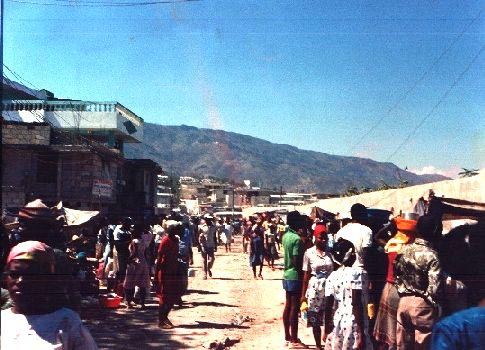
| Want to send this page or a link to friend? Click on mail at the top of this window. |
| First published in The Boston Connection Magazine, June 1999 |
| Jean-Bertrand Aristide, the prophet of deception |
| ___________ |
| By YVES A. ISIDOR |
CAMBRIDGE, MA - From a distance of more than eight years, Jean-Bertrand Aristide claimed to be a prophet, and so were hundreds of thousand Haitians believed him. That, in fact, was when he became president of Haiti, in 1991.
Aristide promised to radically shake up the political and judicial systems, which - far from being alone - he reckoned had been riddled with malpractice and corruption over the past 30 years of the Duvaliers' dynasty.
With the words "We must stop the United States from sucking the blood of the Haitian people by any means necessary," the former leftist priest of the shantytowns, dismissed a few years earlier for attempting to challenge the "successor of the Apostle Peter (Jesus selected Peter as his rock and chief apostle in the Gospel of Matthew), Pope John Paul II, as an apprentice of theology of liberation, promised to change the quality of life of the poor Haitians for the better.
 |
| As the picture, above, shows, nothing has changed, in the positive terms, for the Haitian people. |
And since Aristide later claimed to be a saint as well, the term womanizer was also introduced. The concept womanizer was used so he (Aristide), the alleged father of six illegitimate children, with five different women, could be compared to a sinner like Augustine - the fourth century saint, but first a great philosopher.
Augustine, who was born in 354 in Tagaste, Numidia, now North Africa, was obsessed with sex, or so it appeared in his great work, "The City of God" - in part, a hagiographical book.
"Indeed, as more Haitians were starving to death on a scale nobody wished to contemplate, so were hundreds of political opponents being assassinated in broad daylight. Scary, however, to the Haitians were hundreds of female prisoners of conscience who were allegedly repeatedly raped by guards on the orders of successor Rene Preval, then Aristide's Prime Minister. Those who refused to denounce their husbands and friends as being the presumed enemies of the president had electrical shocks administered to their vaginas. Such was the case of the wife of a colonel of Haiti's long-disbanded "Gendamerie" or army.
As for clean government, the alarming news was Aristide and members of his government pillaged the Haitian public treasury. And many Haitian intellectuals who before were considered quite sympathetic to the little former priest joined his critics.
"We can only contend that Aristide as a former priest has been a good student of Augustine,." said the Haitian intellectuals. Augustine, as a teenager or after he entered the prime of life, stole pears, or so it appeared in his another great work "Confession."
Usually, it is only after a revolution or under the influence of Marxist thinking that a president proposes giving himself power to form a government by decree. However, former Haitian "neighborhood baker-turned-president," Preval, his announcement on January 12 of rule by decree only reassured the Clinton's Administration and advocates of democracy that Haiti was yesterday a "dictatorship of the proletariat", is today a "dictatorship of the Proletariat," and would remain so for a longtime.
 |
| In the above photograph, a U.S. soldier places his right knee on top of a Haitian (a member of the Caribbean nation's army), in an attempt to restrain him, after he was brutally forced to the ground. The photograph was taken during the 1994 U.S. occupation of Haiti. Tyrant Jean-Bertrand Aristide, who affixed his signature at the bottom of a document, authorizing U.S. troops to disembark in Haiti so he could return there from Washington, D.C., the imperialist capital, as he used to call it, after three years of exile, 16 years earlier or so also said by way of his many sermons "Won't we Haitians one day have our own Sandinista Revolution," a reference to the 1979 Nicaraguan revolution, "we will then draw a line in the sand and say you the U.S. if you are crazy enough, if you think you can cross it, just try." |
There since have been serious problems with Preval's announcement for the Haitians - collectively the poorest people in the Americas - as they continue to watch Aristide and Preval do nothing at all to improve their quality of life but squabble for power. Drug trafficking, killings, gross human rights violations, and gross incompetence, to name only these ones, are on the rise.
Of course, not improving the lives of citizens can be dangerous for a former president who aspires to run for the same public office again. So as telling supporters in speeches to burn political opponents alive.
Even for the non-adamant of dictatorship, be it of the far-right or the far-left, the truth can be painful. But the problems enumerated above certainly suggest that Haitians should do everything they can to prevent Aristide, whom for years controls the death caravans that hunts down his critics, from becoming a totalitarian dictator-president of the far-left for a second time, in 2001. Otherwise, the end result for the majority of Haitians is the machine of repression, by far the biggest and most sinister in the Americas, will grow more sophisticated with time. More importantly, a significant increase in the rate of perpetual abject poverty, transcending into tens of thousands Haitians trying to reach Florida on rickety fishing boats.
Yves A. Isidor teaches economics at the University of Massachusetts-Dartmouth and is spokesperson for We Haitians United We Stand For Democracy, a Cambridge, MA-based nonpartisan political pressure group.
| Wehaitians.com, the scholarly journal of democracy and human rights |
| More from Wehaitians.com |